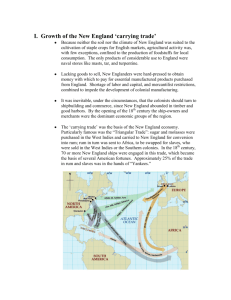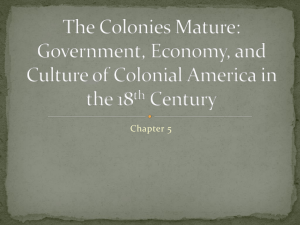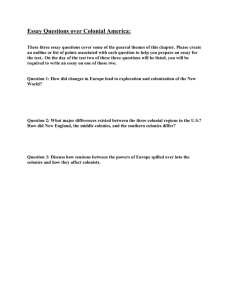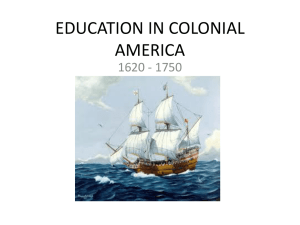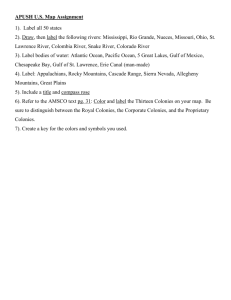"The Navigation Acts"
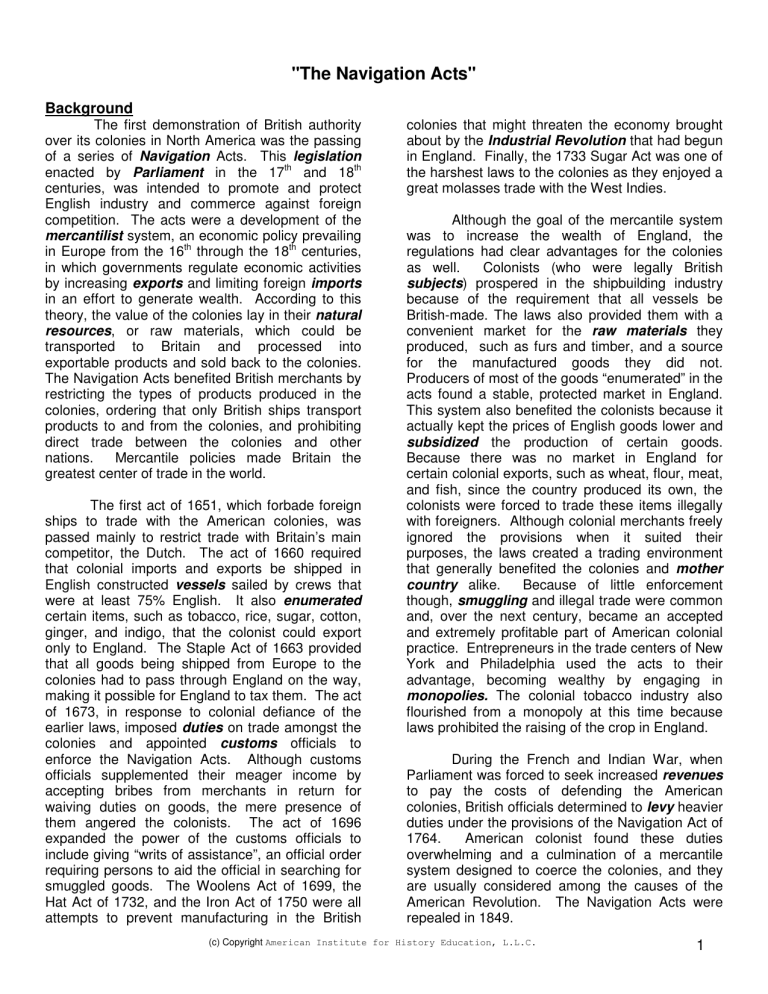
"The Navigation Acts"
Background
The first demonstration of British authority over its colonies in North America was the passing of a series of Navigation Acts. This legislation enacted by Parliament in the 17 th
and 18 th centuries, was intended to promote and protect
English industry and commerce against foreign competition. The acts were a development of the mercantilist system, an economic policy prevailing in Europe from the 16 th
through the 18 th
centuries, in which governments regulate economic activities by increasing exports and limiting foreign imports in an effort to generate wealth. According to this theory, the value of the colonies lay in their natural resources , or raw materials, which could be transported to Britain and processed into exportable products and sold back to the colonies.
The Navigation Acts benefited British merchants by restricting the types of products produced in the colonies, ordering that only British ships transport products to and from the colonies, and prohibiting direct trade between the colonies and other nations. Mercantile policies made Britain the greatest center of trade in the world.
The first act of 1651, which forbade foreign ships to trade with the American colonies, was passed mainly to restrict trade with Britain’s main competitor, the Dutch. The act of 1660 required that colonial imports and exports be shipped in
English constructed vessels sailed by crews that were at least 75% English. It also enumerated certain items, such as tobacco, rice, sugar, cotton, ginger, and indigo, that the colonist could export only to England. The Staple Act of 1663 provided that all goods being shipped from Europe to the colonies had to pass through England on the way, making it possible for England to tax them. The act of 1673, in response to colonial defiance of the earlier laws, imposed duties on trade amongst the colonies and appointed customs officials to enforce the Navigation Acts. Although customs officials supplemented their meager income by accepting bribes from merchants in return for waiving duties on goods, the mere presence of them angered the colonists. The act of 1696 expanded the power of the customs officials to include giving “writs of assistance”, an official order requiring persons to aid the official in searching for smuggled goods. The Woolens Act of 1699, the
Hat Act of 1732, and the Iron Act of 1750 were all attempts to prevent manufacturing in the British colonies that might threaten the economy brought about by the Industrial Revolution that had begun in England. Finally, the 1733 Sugar Act was one of the harshest laws to the colonies as they enjoyed a great molasses trade with the West Indies.
Although the goal of the mercantile system was to increase the wealth of England, the regulations had clear advantages for the colonies as well. Colonists (who were legally British subjects ) prospered in the shipbuilding industry because of the requirement that all vessels be
British-made. The laws also provided them with a convenient market for the raw materials they produced, such as furs and timber, and a source for the manufactured goods they did not.
Producers of most of the goods “enumerated” in the acts found a stable, protected market in England.
This system also benefited the colonists because it actually kept the prices of English goods lower and subsidized the production of certain goods.
Because there was no market in England for certain colonial exports, such as wheat, flour, meat, and fish, since the country produced its own, the colonists were forced to trade these items illegally with foreigners. Although colonial merchants freely ignored the provisions when it suited their purposes, the laws created a trading environment that generally benefited the colonies and mother country alike. Because of little enforcement though, smuggling and illegal trade were common and, over the next century, became an accepted and extremely profitable part of American colonial practice. Entrepreneurs in the trade centers of New
York and Philadelphia used the acts to their advantage, becoming wealthy by engaging in monopolies.
The colonial tobacco industry also flourished from a monopoly at this time because laws prohibited the raising of the crop in England.
During the French and Indian War, when
Parliament was forced to seek increased revenues to pay the costs of defending the American colonies, British officials determined to levy heavier duties under the provisions of the Navigation Act of
1764. American colonist found these duties overwhelming and a culmination of a mercantile system designed to coerce the colonies, and they are usually considered among the causes of the
American Revolution. The Navigation Acts were repealed in 1849.
(c) Copyright American Institute for History Education, L.L.C.
1
Key Terms navigation : science used by sailors to plot their course and determine their location legislation : laws
Parliament : Britain’s law-making assembly mercantilism : trade theory of 1500s-1800s in which major European countries based wealth and power on exporting more than they imported exports : goods that one country sells to another imports : goods that one country buys from another natural resources : raw materials provided by nature vessels : any ship or boat larger than a row boat enumerated : to name one by one duties : tax on goods brought onto a country or sent out of a country customs : taxes on imported goods from another country
Checking for Understanding
1. What were the Navigation Acts?
Industrial Revolution : period of change from making goods by hand to making goods by machine subjects : person or persons under the power or influence of another raw materials : material in its natural condition that can be processed to make it more valuable subsidize : to support or assist with a grant of money mother country : England’s authority over its colonies smuggling : to secretly take goods into or out of a country without payment of lawful duties or taxes monopoly : exclusive control of a product or service revenues : income from taxes or duties, etc. levy: to demand and collect taxes or fines by law
2. Name some items “enumerated” by the acts as being exported from the colonies only to England.
3. Name three examples of exports the colonists had to trade with other countries illegally because England produced its own.
4. In what industry did the colonists prosper due to the navigation acts? Why?
5. In addition to increasing England’s wealth, how was the mercantile system advantageous for the colonies?
6. Why did the tobacco industry flourish in the colonies?
7. When were the Navigation Acts repealed?
8. What did customs officials do to supplement their incomes?
9. Why did Britain levy heavier taxes on the colonies in 1764?
(c) Copyright American Institute for History Education, L.L.C.
2
“Navigation Acts” Worksheet (ANSWERS)
Directions: Answer the following questions about the Navigation Acts.
1. What are the Navigation Acts? (A series of 29 laws passed by British Parliament to control trade conducted by its colonies.)
2. Name some items “enumerated” by the acts as being exported from the colonies only to
England. (tobacco, rice, sugar, cotton, ginger, and indigo.)
3. Name three examples of exports the colonists had to trade with other countries illegally because
England produced its own. (wheat, flour, meat, fish)
4. In what industry did the colonists prosper due to the navigation acts? Why? (Shipbuilding -- The colonists were legally British subjects and all vessels had to be British made)
5. In addition to increasing England’s wealth, how was the mercantile system advantageous for the colonies? (All vessels were required to be British made so the ship building industry prospered.
England also provided them with a convenient and stable market for the raw materials they produced and a source for low priced manufactured goods they did not produce.)
6. Why did the tobacco industry flourish in the colonies? (colonial monopoly because laws prohibited raising this crop in England)
7. When were the Navigation Acts repealed? (1849)
8. What did customs officials do to supplement their incomes? (Accepted bribes in return for waiving duties on goods)
9. Why did Britain levy heavier taxes on the colonies in1764? (To help pay the costs of defending the colonies during the French & Indian War)
(c) Copyright American Institute for History Education, L.L.C.
3
(c) Copyright American Institute for History Education, L.L.C.
4
